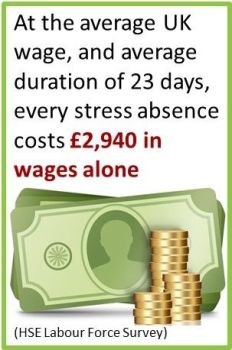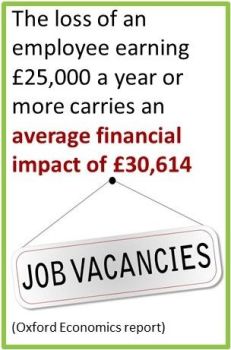Your Business Case and Return on Investment
| Good data can be powerful – but there’s so much available, and pulling it together can be time consuming. We like to support you with the legwork, so here's some of the data which has helped our clients to build their business cases for better Mental Wellbeing. | ||||
 | Mental Health Related Absence This HSE data is based on the average National wage of £31.7K per year. It doesn’t include the costs of temporary staff or overtime to cover absence, so the actual costs to your organisation may be much higher. In our National survey, 16% of people had taken time off because of stress (though just over half gave a different reason). Based on a typical FAST Pathways training investment, 1 prevented absence would pay for training for 65 people. | |||
| Replacing Staff Who Leave 1 in 10 people surveyed by the mental health charity MIND had left a previous job because of stress. In our National survey, 18% of people had considered leaving their current role because of stress. The Oxford Economics report looked at the costs of recruitment, in-house training, and productivity ramp-up for replacement employees. Based on a typical FAST Pathways training investment, 1 prevented resignation would pay for training for 680 people. |  | |||
 | Productivity The additional benefits can be more difficult to quantify, but many people have found the FAST Pathways skills have improved their sleep quality and ability to stay focused, improving productivity and reducing mistakes. Based on a typical training investment, if a common mistake takes 45min to resolve, just 7 prevented mistakes per person per year would cover the cost of their training. The skills have also been found to improve teamwork and problem-solving, and reduce conflict and the resistance to change. | |||
|
The Deloitte national study (originally published with the government-commissioned 'Thriving at Work' report and updated in early 2020) summarises the returns from workplace investment in Mental Wellbeing. Data from 23 different studies shows an average return of £5.20 per £1 invested in Wellbeing
To access this information as a downloadable pdf, CLICK HERE | ||||
 | How else can we support you in building your business case? Get in touch and let's talk |
